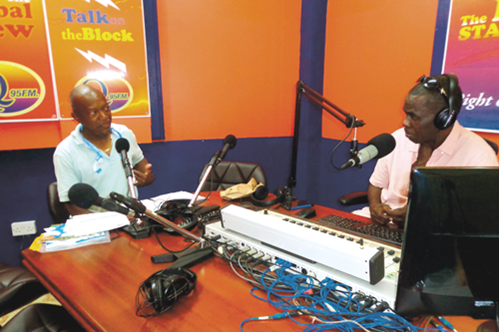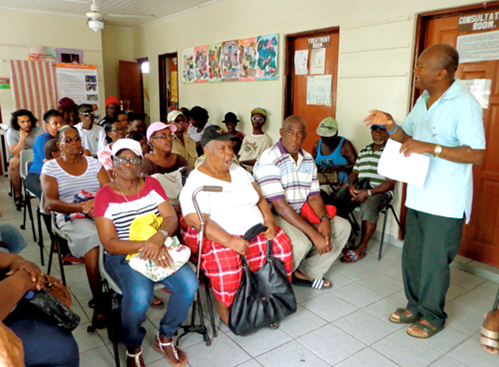The Caribbean Diabetic Retinopathy Project (DR Caribbean) is a five-year project that aims to reduce blindness due to diabetic retinopathy (DR) across four Commonwealth countries: Belize, Dominica, Jamaica and St Lucia. The VISION 2020 LINKS Programme at the London School of Hygiene & Tropical Medicine (LSHTM) began to manage the project in March 2017. It is funded by the Queen Elizabeth Diamond Jubilee Trust [1].
In September 2017 a DR Caribbean workshop was held in Jamaica for all four participating countries. However, due to the severe damage and disruption caused by Hurricane Maria, the team from Dominican was unable to attend. Following a few months of post-disaster recovery in the country, the LINKS Programme team travelled to Dominica in December 2017.
The purpose was for the LINKS and Domican teams to meet, assess the extent of the damage to the eye health services and discuss the future of the DR project with the Permanent Secretary (PS) of the Ministry of Health (MoH). During meetings at the MoH, the PS requested that the project continue due to the country’s concern at the burden of diabetes and its complications, and to use it as a platform to inform and train all stakeholders in prevention and treatment strategies for diabetes. Specifically, the PS requested that the LINKS team plan and coordinate a Diabetes Stakeholders’ Workshop in July 2018.
“Globally, DM is responsible for one death every eight seconds, resulting in significant economic, emotional and social costs.”
After Hurricane Maria hit the island in September 2017 the country’s GDP was set back by over 250%. Maria caused significant damage to health centres around the island and to the Princess Margaret Hospital in Roseau, the capital. Poor management of stress, poor nutrition, increased alcohol consumption and smoking, and poor compliance with medication have all become factors contributing to an increase in diabetes mellitus (DM) related morbidity and mortality after Hurricane Maria.
Dominica is being rebuilt better and stronger. In relation to DM, this focuses on areas that address changes in lifestyle. Some examples are appropriate legislation for packaged foods available to young people, strengthening primary care services and ensuring better compliance with DM management guidelines from health professionals.
Elimination of blindness caused by diabetes is one of Dominica’s VISION 2020 goals. There is universal access to screening for diabetic retinopathy and laser treatment with full country coverage. Funding from the Queen Elizabeth Diamond Jubilee Trust has resulted in the expansion of the already existing screening programme for early detection of diabetic eye disease. However, many diabetics still access the programme when the disease is already too advanced. As a biomarker, this indicates other organ damage is likely to be present. Further emphasis on prevention of diabetes mellitus is key.
In this article, we take a step back from focusing specifically on the eye-related complications of DM, DR, to look more broadly at the issue of DM and the problems caused by it in countries that suffer high prevalence and are seeking to reduce morbidity and mortality by tackling the root causes.
The Diabetes Stakeholders’ Workshop
Planning for the workshop was led by the LINKS team at LSHTM working with Dr Hazel Shillingford-Ricketts, the sole ophthalmologist on the island, and the relevant officers from the MoH. The workshop was held from 2-4 July 2018 in Roseau. Members of staff from Brighton and Sussex University Hospitals NHS Trust (BSUH) participating in the Dominica–Brighton VISION 2020 LINK travelled to Dominica to help deliver part of the workshop programme. Representatives from the other DR Caribbean partners – Belize, Jamaica and St Lucia – were also present.
The objectives of the Diabetes Stakeholders’ Workshop in Dominica were:
- Improve knowledge about DM and DR in Dominica
- Update and share information between the different stakeholders involved in prevention of diabetes and its complications in Dominica
- Issue recommendations for improving prevention of diabetes and its complications in Dominica
At the end of the workshop, delegates should have:
- Increased their knowledge of diabetes, its complications and the prevention and control strategies available to deal with DM.
- Understood the multidisciplinary nature of diabetes prevention and the roles of each stakeholder group in preventing and controlling DM and its complications.
- Shared learning on practical improvements to improve services for DM in Dominica.
The Minister for Health and Social Services, the Hon Dr Kenneth Darroux, addressed the delegates and welcomed the initiative to hold the Diabetes Stakeholders’ Workshop, thanking Dr Shillingford-Ricketts and the LSHTM LINKS team for the opportunity to work on this very important health issue in Dominica. The Minister for Education, the Hon Petter Saint Jean, and the Director of Agriculture Mr Ricky Brumant, were also in attendance.
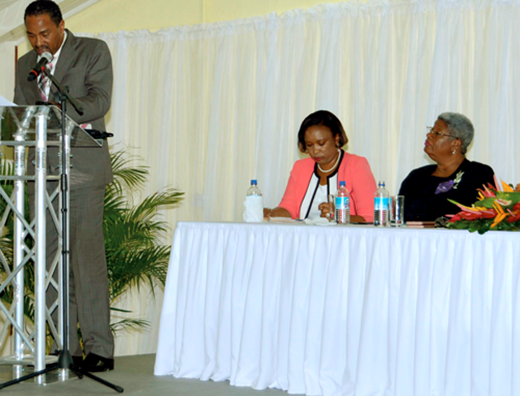
The Hon Dr Kenneth Darroux, Minister for Health and Social Services, giving the opening address.
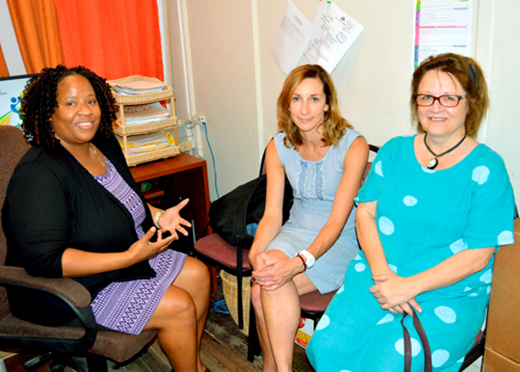
Mrs Mignon Rolle-Shillingford, Director of Health Promotion, Ministry of Health, Dominica; Ms Alyson Suarez, Nutritionist, Brighton and Sussex University Hospitals NHS Trust; Ms Carolyn Hogg, Diabetes Nurse, Brighton and Sussex University Hospitals NHS Trust.
Workshop highlights
1. Epidemiology of DM and DR in the Caribbean and in Dominica
Dr Andrew Smith, Diabetologist, BSUH; Professor Dalip Ragoobirsingh, Diabetologist, University Hospital of the West Indies (UHWI), Jamaica; Dr Lizette Mowatt, Ophthalmologist, UHWI and Dr Ahmed Shalauddin, Epidemiologist, Dominica.
This session looked at the global epidemiology of DM, then focused on the Caribbean situation and on Dominica in particular.
Global estimates: DM prevalence among adults was estimated to be 425 million [2] or one in 11 persons globally have DM. The distribution is not homogenous and three-quarters of DM is found in low- and middle-income countries (LMIC) [3]. Two out of three people with DM are in the working age group and live in urban areas. Globally, DM is responsible for one death every eight seconds, resulting in significant economic, emotional and social costs.
Specific mention was made of Nauru Island in the South Pacific. Before independence in 1968, Nauru was a healthy nation whose diet comprised mostly fruit and vegetables. After independence, Nauru adopted a western culture. Fifty years later, 94% of the population is overweight and 71% obese. There is a 31% prevalence of DM in the country, the highest in the world [4].
Caribbean estimates: Prevalence rates for diabetes range from 11% to 18% in several countries in the Caribbean [5]. Cultural practices and diet have resulted in 25% of the adult Caribbean population being overweight. The younger generation is even more affected: a third of adolescents are overweight.
A mixture of risk factors affect the prevalence of DM. Some are controllable (weight and physical activity) and some are not (ethnicity and heredity). The importance of controlling DM through appropriate diet and exercise was emphasised.
Dominica estimates: The population aged >60 years make up 14% of the total population. Life expectancy is 76 years for women and 70 years for men. DM was listed among the top five leading causes of death among both females and males in Dominica, with females more affected than males. The difference is not explained by women accessing services more than men; the distribution of hypertension in the country was found to be 50/50 in males and females in 2017.
People in the age group >70 years had the highest amputation rate, with M>F. The most common types of amputation due to DM differ between men and women. Most men are amputated at the toe level, whereas women are more likely to need amputation below the knee. The same proportion of men and women are amputated above the knee.
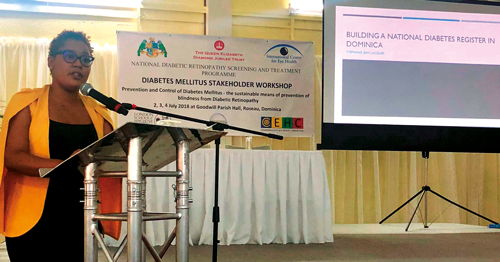
Stephanie Jean-Jacques, optometrist and MSc student, LSHTM.
2. DM prevention: UK and Dominica experiences
Ms Carolyn Hogg, Diabetes Nurse, BSUH and Dr Laura Esprit, Director of Primary Care, Dominica.
This session provided an overview of the evidence base for prevention of DM at population level and at individual level, including examples of programmes or initiatives delivered in the UK and in Dominica.
UK
Ms Hogg’s presentation provided evidence from other settings including the USA, Sweden and China, which showed that lifestyle changes such as diet and exercise (and a combination of both) has resulted in significant reductions in the risk factors for, and prevention of, Type 2 DM.
UK challenges:
- One in three children are overweight
- Availability of sugary snacks
- Advertising
- Sedentary lifestyle
- Portion size
UK solutions:
- Childhood Obesity Strategy 2016 in the UK, aimed at significantly reducing childhood obesity in the next 10 years
- A sugar tax was introduced in the UK in April 2018 on products that have >5g sugar per 100ml
Dominica
Primary and secondary prevention of DM in Dominica is delivered through the following components:
- Identification of persons at risk of DM: this takes place in the primary care setting.
- Investigations: diagnosis of DM includes lipid profile, thyroid profile test and referral for eye examination. Fasting blood sugar is tested, followed by monitoring of blood glucose level and referral for blood testing in hospital if required.
- Management: establish and maintain good DM control and avoid complications from the condition. The goals vary according to the type of DM and the age group.
- Diet: the six food groups should be used as a guide when planning meals. The eating profile, blood glucose levels, weight and physical activity need to be taken into consideration when planning meals. Nutrition guidelines should be modified for pregnant women and those lactating, the elderly and those with co-morbidities. The use of local foods and seasonings and appropriate size of portions should be advocated.
- Role of district nurse: investigations, referral, counselling, education, follow-up and prescriptions for medication. House-bound people living with diabetes (PLWD) are visited every six months.
3. Building a National DM register in Dominica
Stephanie Jean-Jacques, optometrist and MSc Public Health for Eye Care student, LSHTM
This presentation highlighted the value of establishing diabetes registers and the impact that they can have on delivering prevention and treatment services for people with diabetes.
Dominica is estimated to have over 8000 PLWD amongst its population of 74,000. This is expected to rise due to lifestyle choices and the high rates of obesity on the island, which are key risk factors for DM.
Diabetes registers have been shown to be an effective intervention in the management and control of DM and its complications. A DM register carries important personal, clinical and contact information and may be hospital- or community-based.
Factors to be considered when establishing an electronic register of PLWD:
- Implementation plan
- Adequate registry documentation
- Data quality and confidentiality
- Flexibility
- Technology
- Determination of data elements
- Data access policy
- Framework for disseminating data and findings
Conclusion
At the end of the workshop it was noted:
- The burden of diabetes and its complications in Dominica are a public health concern and have been exacerbated by the effects of Hurricane Maria.
- Strong support from MoH to prioritise prevention programmes for diabetes and its complications was key to controlling the problem.
- The Diabetic Retinopathy Screening and Treatment Programme had been a catalyst to stakeholders addressing diabetes prevention needs in Dominica.
- Scaling up the DRS Programme requires education of the physicians and nurses who diagnose and treat people with diabetes in primary care.
- The prevention strategy for Dominica going forward should include comprehensive diabetic care clinics where patients can access the family physician, eye screening and foot screening in one location, thus improving compliance.
Tony Kelly – Diabetes UK Community Champion
Diabetes UK has Community Champions who volunteer to talk to community groups, particularly those not reached by standard health promotion activities. Tony Kelly has a long history of health promotion on behalf of Diabetes UK throughout the West Midlands. He kindly agreed to join the workshop and share experience and tips for reaching those who are hard-to-reach. He feels that the key message for self-management is to increase levels of physical activity and know how to adapt diet to the condition. He lives out his belief, having been diagnosed with Type 2 diabetes 12 years ago and been successful in managing his condition without requiring any medication.
As well as speaking during the workshop, Tony Kelly undertook several health promotion visits to different communities within Dominica, where he spoke to groups of PLWD. He also recorded interviews on local radio to inform listeners about lifestyle changes and living with diabetes.
References
1. The Queen Elizabeth Diamond Jubilee Trust
www.jubileetribute.org/
2. IDF Diabetes Atlas Eighth Edition 2017
http://diabetesatlas.org/resources/2017-atlas.html
3. IDF Diabetes Atlas Eighth Edition 2017
www.diabetesatlas.org/faq.html
4. Obesity in the Nauru. Wikipedia
https://en.wikipedia.org/wiki/Obesity_in_Nauru
5. Boyne MS. Diabetes in the Caribbean: Trouble in paradise. Insulin 2009:4(2). ResearchGate:
www.researchgate.net/publication/
236892880_Diabetes_in_the_Caribbean_Trouble_in_paradise
(All links last accessed August 2018)
Acknowledgment: The authors would like to thank Stephanie Jean-Jacques for providing summary minutes of the workshop.
COMMENTS ARE WELCOME

